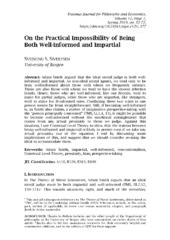On the Practical Impossibility of Being Both Well-Informed and Impartial
Peer reviewed, Journal article
Published version

Åpne
Permanent lenke
https://hdl.handle.net/1956/21003Utgivelsesdato
2019Metadata
Vis full innførselSamlinger
- Department of Philosophy [234]
Originalversjon
https://doi.org/10.23941/ejpe.v12i1.377Sammendrag
Adam Smith argued that the ideal moral judge is both well-informedand impartial. As non-ideal moral agents, we tend only to be truly well-informed about those with whom we frequently interact. These are also those with whom we tend to have the closest affective bonds. Hence, those who are well-informed, like our friends, tend to make for partial judges, while those who are impartial, like strangers, tend to make for ill-informed ones. Combining these two traits in one person seems far from straightforward. Still, if becoming well-informed is, as Smith also claims, a matter of imaginative perspective-taking with the “person principally concerned” (TMS, I.i.1.4, 13), it might be possible to become well-informed without the emotional entanglement that comes from any actual proximity to those we judge. Against this intuition,I use Construal Level Theory to show that the tension between being well-informed and impartial is likely to persist even if we take any actual proximity out of the equation. I end by discussing some implications of this, and suggest that we should consider revising the ideal to accommodate them.